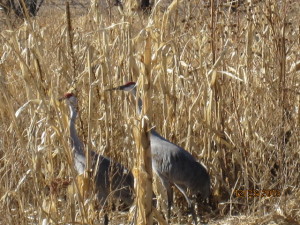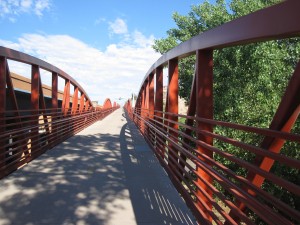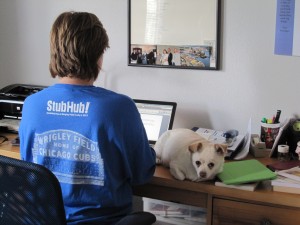I don’t love Ernest Hemingway. I need to start with that. But in his Nobel prize speech, Ernest Hemingway said, “if he is a good enough writer,” (it was always a he), “he must face eternity, or the lack of it, each day.”
For at least twenty-six years of my life, I had no idea what he meant. Hold that thought for a minute.
A small stretch of Montaño Road between Coors and Carlisle runs like a furrow through the middle of my life. I could say it runs like Marvle Valley Drive, or Clifton, or Irishtown Road, because it runs like those streets I spent my first twenty years walking and sled-riding and learning to drive on. Going east Montaño opens into mountain. Driving back home mesa dissolves in sky.
For a number of years now, it has seemed that if I am going anywhere, I am driving across the river on that stretch of Montaño. Thursday nights and Sunday mornings, I head across the bridge to St. Michael and All Angels. Saturday mornings, I turn right on Carlisle for violin lessons with my granddaughter. Sunday afternoons, I turn right on Fourth Street to play mandolin with Ken, Elizabeth, Katie, and Steve. I’ve ridden across this bridge on my bike and run across it training for a half marathon. One sad morning in 2011, I walked to the middle of the bridge with a group of teenagers and dropped flowers in the river. Monday afternoons after that sad morning, I drove across the bridge to a warm office just east of Carlisle to try to regain my footing in the world.
On those Monday afternoons, the bridge was full of breakthroughs. I’d be on my way home from my appointment; crossing the bridge, something would snap into place. I’d find clarity around a question, or a decision, or just a new ability to make sense of what I was feeling. It’s as though these roads we live on wear grooves in us, instead of the other way around.
Somewhere in those years, I decided I needed to write now. I was teaching teenagers, not fighting bulls or going on African safaris, but I was facing, for the first time, eternity, or the lack of it, every day.
In November, when the light grows shy, the cranes come. They stand in the fields on the north side of the road by Los Poblanos. Thanksgiving morning, four of them rise out of the cornfield just beyond the bike path and pedal into the air. I am on my way to meet my friend Martha for a hike. I am listening to Lori True singing “Go Now in Peace.” My heart is going all squinchy, as though those cranes are tugging at it and pulling me up into the air with them.
Thanksgiving morning is warm. When I meet Martha and her pug Saki at Elena Gallegos, I get Rusty on his leash, tug my sweatshirt off over my head in the sun, and head into Pino Canyon. The first part of the trail is relatively flat and exposed, and Rusty and Saki set a good pace. Soon we’re moving deeper into trees and climbing.
Part of my plan for this hike is for Martha to help me fix my life. “I’m not writing,” I had told her earlier in the week. “I’m spending every second working. I have to figure out how to change things.”
Martha is looking for change, too. A health scare in the middle of the night has left her with a sense of urgency. “I’m not waiting,” she told me. “If there is something to do, I need to do it now.” Our plan is to walk up the mountain and figure everything out.
About a mile or so in, a massive bolder flanks the trail. Sun-warmed and statuesque, it’s the sort of rock Tolkien could have turned into a hotel for hobbits. I wouldn’t be at all surprised if we walked around the back and found a tiny door. Martha pauses by the rock as she always does, pats it, and says hello. We give the dogs some water and keep climbing.
In a little while, we reach the point on the trail where it feels as though the mountain has rotated; suddenly the highest ridge we can see is to the north rather than the east. I always find this spot disorienting. I’m looking out through the trees to the model train city far below when Martha tells me I should write about friendship. It’s unique, she says. It’s free of the obligations and expectations we get tangled in with every other kind of relationship. It’s profound, she says. Metaphysical. Holy.
I started writing today thinking I might have something to say about gratitude. I wanted to say that at this time of year, the leaves still hanging on the white plum in my front yard are the same color as the cranberries boiling on the stove. In late afternoon, the sun comes rushing through the window and transforms my office into a chapel.
A few weeks ago I thought I was writing a different essay. I was trying to figure out if I live in a body or as a body. Which part is me? Today, hiking up a mountain with a friend, it doesn’t feel like the right question. Something has been changing in me. It’s as though my edges are dissolving: the boulder, the cranes stepping into air, the light in my plum tree, the spots of snow by the side of the trail, lately it’s been feeling like all one thing. There’s not so much here and not here, less wondering about what’s me and what’s not-me.
In I and Thou, one of those books I read in college that bobs up into my consciousness now and then, Martin Buber says, The primary word I-Thou can be spoken only with the whole being. Concentration and fusion into the whole being can never take place through my agency, nor can it ever take place without me. I become through my relation to the Thou; as I become I, I say Thou: All real living is meeting.
So I am thinking about friendship, and the holy way in which we are connected to our friends, and the fact that all real living is meeting. Martha is laughing and remembering another hike where I fell dramatically into cactus when I remember that matter is neither created nor destroyed in this universe. I must have learned that phrase in ninth grade physical science, along with Bernoulli’s Law, “the faster a fluid moves the lesser is its pressure.” I remember those words devoid of any scientific understanding; I just like the way they sound.
Recently, though, I started wondering what it means that matter is neither created nor destroyed. I googled E=mc2 and read about the law of the conservation of mass-energy. I looked at pictures of people on space ships bouncing light off of mirrors and read that mass and energy are different forms of the same thing. I read about Einstein and Newton and Lavoisier and clicked through a web site that claims the First Law of Thermodynamics proves the existence of God. I read Martin Buber, who describes God as “the mystery of the self-evident, nearer to me than my I.”
I don’t understand any of it. It’s Thanksgiving morning and Martha and I have climbed as high as we can for today so we turn around. I’m heading down a mountain with my dear friend, and Rusty is in a hurry. I’m trying not to fall as his energy tugs on my matter and light splashes down on us through branches and leaves. Martha keeps her camera close in case I cartwheel into another cactus.
There were a lot of years when I never thought about dying or loss or even really let myself fully feel the loss of people I loved. And then there were years when loss shook me like an earthquake, and I had to relearn to trust the ground to hold. For a while now, I think I’ve been in this other space: I get it. I face eternity or the lack of it every day. I know loss throws you to the ground like lightning, and at some point, I decided to love anyway.
That’s an empowering choice, maybe even a brave and ordinary one, but it didn’t take away the fear. I hate flying. I won’t ride roller coasters. Sometimes I can’t shake a huge sadness at the thought that someday everything will go on without me. It seems too much, really, to ask of a species: to hold in our minds at one time the knowledge that life is meaningful and that life ends.
Martha and I stop again by the boulder that either rose up or crashed down to this spot millions or billions of years ago. I’m thinking that matter and energy are just different forms of the same thing, and that they are neither created nor destroyed in this universe. Everything, it occurs to me, is transformation.
Maybe all I’m trying to say is that lately I don’t feel quite so temporary. Thanksgiving morning I walked up a mountain and I walked down a mountain and I drove across a bridge. I talked to a friend and I said hello to a boulder. Light kept hurrying to the earth. I am guessing the sun will come up again in the morning and streak gray and blue across this desert sky. Crows and geese and cranes will settle on the pond and the river will keep sidling south. Martin Buber says, “The present is not fugitive and transient, but continually present and enduring.”
Some mornings, I believe.




